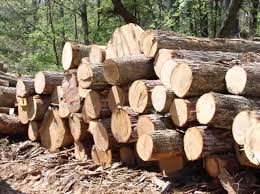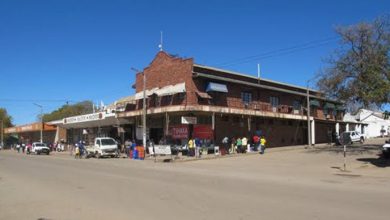Desertification looms in Lupane and Tsholotsho due to high deforestation

By Dumisani Nyoni
Some villagers in Lupane and Tsholotsho, miffed that they are not benefiting from the multi-million dollar timber business in their backyard, have resorted to deforestation to spite companies operating in their communities.
Lupane and Tsholotsho are some of the districts in Matabeleland North endowed with vast natural resources like timber, especially the prime teak wood which is used for boat building, yachts, exterior construction, indoor and outdoor furniture, veneer, carvings, frames and more.
The districts, however, remain poor as seen in schools in forestry areas having no infrastructure while poverty due to joblessness haunts the villagers.
Protests by villagers against the harvesting of the prime teak wood for commercial purposes without any evident benefits have fallen on deaf ears, forcing them to adopt a bizarre solution of indiscriminately cutting down teak trees to sabotage companies that are involved in timber harvesting.
“If you can’t beat them, join them. We have been engaging the government to make sure that villagers are benefiting from their resources in their communities to no avail. As such, we have resorted to destroying that business as it does not benefit us,” one Tsholotsho villager, Dingumuzi Ncube, said.
Lupane Youth for Development programmes coordinator Tawanda Mazango said villagers had resorted to compensatory behaviour to sabotage companies involved in timber harvesting.
“They are doing what we call compensatory behaviour. They don’t care. In the next coming few years there will be no teak to talk about in Lupane,” Mazango said.
“There is a need to raise awareness on the importance of trees, particularly timber trees. As an organisation, we are pushing for communities to benefit from their resources so that there will be no compensatory behaviour,” he said.
Chief Mabhikwa of Lupane weighed in saying “people are frustrated.”
“This is a serious concern for us. What is more worrying also is the fact that villagers do not benefit anything from timber resources. We are going to engage the council and map the way forward.”
Mabhikwa said some people were even logging immature trees.
The move by villagers, if not addressed, will leave Lupane and Tsholotsho poorer as cutting down of trees without reforestation leads to desertification.
It also contributes to climate change.
Deforestation gutted 37% of Zimbabwe’s forested land between 1990 and 2015, leaving 87 000 hectares (about 215 000 acres), according to a 2015 report from the Food and Agriculture Organization.
At least six million tons of timber is consumed annually for fuel, about 1.4 million tons more than Zimbabwe’s forests can sustainably provide, according to a 2014 report from Zimbabwe’s Ministry of Environment, Water and Climate.
That means Zimbabwe is losing 330 000 hectares (more than 815 000 acres) of forest – over 60 million trees a year. The current planting rate is about 8 million a year.
Kusile Rural District Council (RDC) chief executive officer, Christopher Tshuma, whose organisation is responsible with timber harvesting in Lupane, claimed that villagers were benefiting from the timber industry.
“Villagers get 20% from timber harvesting. We have built Ingubo Secondary School at Manasa village using timber resources. People are seriously benefiting from timber resources,” he claimed.
On cutting down of immature trees, Tshuma said: “It can’t be true because those logging timber will be working with the Forestry Commission. The minimum radius is 30cm. We do not give specific companies a permit to log timber but anyone can come and pay a fee to be allowed to log timber,” he said.
Asked whether those involved in timber harvesting were doing reforestation, Tshuma said: “Replacement for now is the challenge but we have talked about it as a council. We need to come up with a policy because you can’t just force a person. We need to come up with a policy so that when you cut a tree you replace it. Currently, there is no policy.”
Tsholotsho Rural District Council chief executive officer, Nkululeko Sibanda, said when timber has been harvested, 60% goes to villagers and 40% is for administration fees.
“So what it means is that villagers identify a project and then start working on it,” he said.
Sibanda said the new contracts that they have signed with timber companies would ensure that local villagers benefit more from their resources.
“We have resolved to say no round logs should go out of Tsholotsho but companies should mount some saw mills here. We have allowed them up to December 2020 to move the round-logs to Bulawayo because their market is here. We want round logs to move from Tsholotsho as finished products so that we can create employment for Tsholotsho youths,” Sibanda said.
Forestry Commission spokesperson, Violet Makoto said unlike in Tsholotsho where the logging companies have contracts between the RDC, logger and Forestry Commission, in Kusile RDC (Lupane) it’s the local council that’s cutting and selling logs to clients.
In other words, there is no contracted logger, she said.
“Immature trees can only be cut where illegal timber logging is taking place because legal concessions are supervised by Forestry Commission timber measurers. Timber measurers actually mark trees that can be felled in a concession so if there is any harvest of immature trees, it’s an illegal harvest,” Moyo said.
National tree ambassador Never Bonde said what is happening in Lupane and Tsholotsho was really worrisome.
“I think there is a lack of education. Our people need to be educated because in the next 10 years, we are going to run out of this type of a tree (teak),” he said.
“We need to protect our trees. It takes about 30 years to fully grow a teak tree, so we can’t afford to destroy them like that.”
Bonde said a permit to harvest timber cost an equivalent of about US$3, which is too little.
“There is a need to review these charges to make them deterrent. Right now almost everyone has a permit to harvest timber or firewood. I would like to urge people to be responsible because we are destroying our future. We are destroying the future of our children. What we are doing is very bad,” he said.
In its latest report, Matabeleland Institute for Human Rights urged local authorities and companies to ensure that the communities in timber areas enjoy right to development, right to employment, social and economic rights including workers should have the right to a safe working environment.
As part of measures to make sure that local people benefit from their local resources, devolution was adopted as a key component of the new Constitution of Zimbabwe of 2013.
Chapter 14 of the Constitution states that whenever appropriate, governmental powers and responsibilities must be devolved to provincial and metropolitan councils and local authorities which are competent to carry out those responsibilities efficiently and effectively.
The objectives of the devolution of governmental powers and responsibilities to provincial and metropolitan councils and local authorities are to give powers of local governance to the people and enhance their participation in the exercise of the powers of the State and in making decisions affecting them.
It also aims at promoting democratic, effective, transparent, accountable and coherent government in Zimbabwe as a whole; preserving and fostering the peace, national unity and indivisibility of Zimbabwe; recognising the right of communities to manage their own affairs and to further their development; ensuring the equitable sharing of local and national resources; and transferring responsibilities and resources from the national government in order to establish a sound financial base for each provincial and metropolitan council and local authority.
But in practice, devolution policy on local resources is not being implemented in Zimbabwe.






